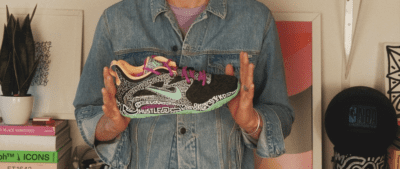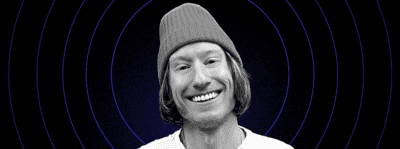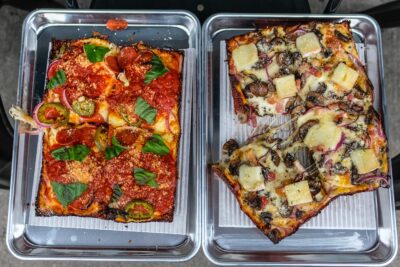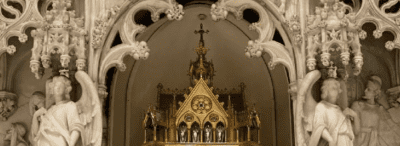Courtesy the Overcoats
Indie-pop duo Overcoats releases ‘Used to be Scared of the Dark’
Dripping in harmonies, the new EP is something of a post-quarantine comedown, with shades of St. Vincent and Simon & Garfunkel
Indie-pop duo Overcoats have seen a lot of the world: singer-songwriter Hana Elion spent some of her younger years in Jamaica, Uganda, and Belize; JJ Mitchell was born in London and grew up in New York, England, and Egypt.
But for both of them, New York is home. A lyric from “The Hardest Part,” a song from the group’s new EP, “Used to be Scared of the Dark,” evokes a moment at the beginning of their career when the pair lived in, as Mitchell puts it, a “tiny shoebox” in Lower Manhattan: “First apartment on the Lower East Side, I’d hate the noise but you love the light.”
“I think New York has a special way of existing as both a tough and beautiful reality,” says Mitchell, who now lives on the Upper West Side. “Also it encapsulates everybody’s dream.”
“Used to be Scared of the Dark,” a four-song EP written largely during lockdown, is out today. Quarantine, however, didn’t necessarily affect their writing style too much—they’re used to working semi-remotely, constantly pitching one another ideas over the phone.
“The urgency of New York has really made it into our process,” says Elion, who is based in Brooklyn. “Like if we have an idea on the street or on the subway, we’re singing it into our phones, there’s the 1 a.m. back and forth—that sense of ambition and urgency has always been a part of what we do.”
Taking cues from a wide range of artists like the Velvet Underground, the Beach Boys and Kacey Musgraves, “Used to be Scared of the Dark” is electronic avant-pop dripping in harmonies—St. Vincent meets Simon and Garfunkel. Overcoats is quietly, almost inadvertently, reimagining what indie rock sounds and looks like.
Laid bare
Neither Mitchell nor Elion felt destined for a career in music. They met in an introduction to anthropology class at Wesleyan College in Connecticut—Mitchell was studying Middle East history and politics, Elion, philosophy of religion.
“It wasn’t exactly clear that we’d become an indie duo with those degrees,” Mitchell jokes.
Both had a keen interest in music though, and started dabbling in co-songwriting, discovering they had a unique knack for singing in tight harmony. They finished their senior year of college with a win at the college’s battle of the bands. About a year after graduating, they released their 2015 debut self-titled EP, which featured some of those songs.
“It was the only thing that made any sense to us,” says Mitchell, “Everything just gets laid bare in those moments where you have to decide what you’re supposed to be doing with the rest of your life. And we decided to follow what felt good, and for us that was singing together and not writing essays.”
‘Like Radiohead, but cool’
Their first full length LP, 2017’s “YOUNG,” was released on a small indie Canadian label, Arts & Crafts Productions, a deliberately independent choice.
“All too often you see somebody signing to a label and a lot of people want to tell them how they should look or what their songs should sound like,” Mitchell says. “It was really important for us to really cement who we were before we went to a label that might have opinions.”
Part of forging that identity meant breaking into a genre of music that doesn’t always take as kindly to female duos. Elion and Mitchell take this matter seriously, but they’re also not unwilling to crack a few jokes about it (while also maintaining an “are-they-or-aren’t-they-together” mystique). An FAQ question on Overcoat’s website asks “How would you describe your music?” The answer: “Like Radiohead, but cool.”
“Radiohead just represents what has been walled off to us as female musicians and what has been really mansplained to us by male musicians,” Elion says, who noted that she and Mitchell actually quite like Radiohead. “When we were writing our last record, we realized that so many of our influences—glam rock and indie rock of the ‘90s—it was all boy bands. And we were just like, ‘Fuck, this sucks’.”
“Used To Be Scared of the Dark” is the first time the band has collaborated with outside musicians, which they did remotely with artists Tennis, Lawrence Rothman, and Middle Kids.
Still, Overcoats remains “a community of two—and it has been since the beginning,” Mitchell says. “In opening things up both of us have to be less precious about what we’re putting on the table.”
Their last album, 2020’s “The Fight,” released days before the pandemic shutdowns, ironically focused on “apocalypse … climate change, death, and just what to do when things go tits up, in a poetic way,” Elion says. The songs on “Used to be Scared of the Dark” feel like the next chapter; a sense of strength and perseverance in the aftermath of hardship.
“This body of work feels like the kind of comedown after you’ve had the fight,” says Mitchell. “Like you’re back from battle and you’re reflecting on it.”
There’s a lot to reflect on—Overcoats are already at work on their next album—but this EP offers an opportunity to pause and reflect.
“It really is an extension of who we are as people and our relationship and what we go through in the world,” Elion says. “So I hope that people can see it as authentic, and also because of that, find ways that it can relate —and bring healing—to their own lives.”
“Used To Be Scared of the Dark” is out today. Overcoats will play their next live show September 18 at the Music Hall of Williamsburg.
You might also like 


























